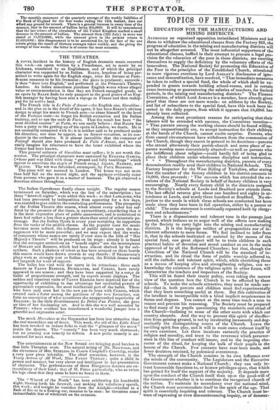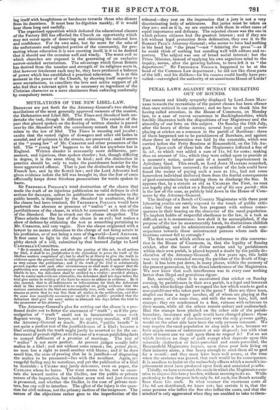TOPICS OF THE DAY.
EDUCATION FOR THE MANUFACTURING AND MINING DISTRICTS.
ALTHOUGH an organized opposition intimidated Ministers and led them to withdraw the educational clauses from the Factory Bill, the progress of education in the mining and manufact uring districts will not be altogether arrested. The most influential supporters of the educational clauses, baffled in their attempt to procure a legal pro- vision for the education of the poor in those districts, are exerting themselves to supply the deficiency by the voluntary efforts of the benevolent. The National Society for promoting the Education of the Poor in the principles of the Established Church, stimulated to more vigorous exertions by Lord ASHLEY'S disclosures of igno- rance and demoralization, have resolved, "That immediate measures be taken to collect a special fund, the whole of which shall be ex- pended in grants towards building school-rooms, and in certain cases increasing or guaranteeing the salaries of teachers, for limited periods, in the mining and manufacturing districts." The Finance Committee, of which Lord ASHLEY is a member, have already given proof that these are not mere words : an address by the Society, and list of subscribers to the special fund, have this week been in- serted in the daily papers, from which it appears that 58,6901. has already been collected.
Among the most prominent reasons for anticipating that their labours will be attended with success, the Committee mention- " That parents among the working classes should be found willing, as they unquestionably are, to accept instruction for their children at the hands of the Church, cannot excite surprise. Parents, who from casual circumstances have withdrawn from the communion of the Church, though they assent in general to its doctrines—parents who attend alternately their parish-church and some place of se- parate worship more conveniently situated—as well as parents who are indifferent about religion—could hardly fail of being glad to place their children under wholesome discipline and instruction.
* * Throughout the manufacturing districts, parents of every denomination readily send their children to National Schools. The Factory Inspector for the West Riding of Yorkshire, after stating that the number of the factory children in his district amounts to 10,000, thus proceeds : "fhe success which has attended the ex• ertions of the National Society in behalf of factory children is very encouraging. Nearly every factory child in the districts assigned to the Society's schools at Leeds and Bradford now attends them. The last official returns give about one hundred and eighty in at- tendance at Leeds, and nearly three hundred at Bradford. No ob- jection to the mode in which these schools are conducted has been made since they have been in full operation, either by a parent or child.' The same statement is continually repeated both by clergy- men and schoolmasters?'
There is a dispassionate and tolerant tone in the passage just
quoted, which induces us to augur well of the efforts now making by the Society to carry light into the mining and manufacturing districts. It is the language neither of propagandists nor of in- tolerant adherents to mere forms. We feel inclined to infer from it, that in the schools instituted or assisted by the means of the special fund, one great object will he to train children in such practical habits of devotion and moral conduct as are in the main approved of by all the Reformed Churches ; but that, though the Catechism of the National Church will be the standard of in- struction, and its ritual the form of public worship adhered to, still the catholic and tolerant spirit, which, while cherishing these as a means of keeping alive and strengthening religion, can ac- knowledge the existence of the religious spirit in other forms, will characterize the teachers and inspectors of the Society.
This will be found their truest policy, even taking the narrow
view of the question how the Church is to be affected by these schools. To make the schools attractive, they must be made use- ful—that is, both parents and children must feel experimentally that they learn something useful at them. But this cultivation of the intellect is incompatible with a blind implicit acquiescence in forms and dogmas. You cannot at the same time teach a man to reason and prevent his reasoning. The Society must be prepared to find many of its pupils questioning the standards and ritual of the Church—inclining to some of the other sects with which our country abounds. And the way to prevent this spirit of disaffec- tion from gaining ground, is not by inculcating incessantly and dog- matically the distinguishing tenets of the Church. Leave the cavilling spirit free play, and it will in most cases exhaust itself by its own exertions. Let them inculcate earnestly the practice of religion and morality, and trust to the reverence which persever- ence in this line of conduct will insure, and to the imposing cha- racter of the ritual, for keeping the bulk of their pupils in the bosom of the Church. Few converts have ever been made, and fewer doubters retained, by polemical controversy.
The strength of the Church consists in its own influence over the minds of the community. The Legislature and the Executive Government cannot make a National Church ; they can only in- trust honourable functions to, or bestow privileges upon, that which has gained for itself the support of the majority. It depends more
upon the conduct of the Church itself than upon the good-will of the Government whether it is to continue the recognized church of the nation. To maintain its ascendancy over the national mind, the Church must accommodate itself to the spirit of the age. That spirit is essentially inquiring and tolerant. The Church must be- ware of repressing or even discountenancing inquiry, or of demean-
log itself with haughtiness or harshness towards those who dissent from its doctrines. It must bear its dignities meekly, if it would bear them long and usefully. The organized opposition which defeated the educational clauses of the Factory Bill has afforded the Church an opportunity which may not occur again of deserving and obtaining the national love and confidence. For its own sake, but far more for the sake of the unfortunate and neglected portion of the community, for pro- moting whose education it is now exerting itself, is it to be desired that it should use the occasion well and wisely. The worst evil to which churches are exposed is the generating of an exclusive narrow-minded sectarianism. The advantage which Great Britain has derived from the number and strength of its religious sects is, that however intolerant each may be, they have produced a balance of power which has established a practical toleration. It is at this moment in the power of the Church, by showing itself superior to mere sectarianism, to conciliate the love and active support of all who feel that a tolerant spirit is as necessary an ingredient of the Christian character as a mere abstinence from enforcing conformity by compulsory means.



























 Previous page
Previous page